- Home
- Parnell Hall
02-Murder
02-Murder Read online
Praise for Parnell Hall’s mystery MURDER
“This thoroughly inventive novel heralds the very welcome return of Stanley Hastings ... who alternates his inspired blundering with rare moments of ruthless cunning.”
—Booklist
“By turns hair-rasing and hilarious”
—Publishers Weekly
“Loaded with warmth, wit and plot, MURDER is a gem of a novel.”
—Rave Reviews
“Author Hall's swift, spare prose captures the grit of Manhattan and the insurmountable difficulties of battling crime. He has also created a thoroughly credible character in the irrepressible Hastings.”
—St. Louis Post Dispatch
MURDER
Parnell Hall
Copyright © 1987, 2011 by Parnell Hall
Published by Parnell Hall, eBook edition, 2011.
Published by Onyx Books—NAL, 1989.
ISBN:0-451-40110-7
Originally published by Donald I Fine,Inc., 1988.
ISBN:1-55611-058-8
All rights reserved. No part of this book may be reproduced in whole or in part without written permission from the author, except by reviewers who may quote brief excerpts in connection with a review in a newspaper, magazine, or electronic publication; nor may any part of this book be reproduced or transmitted in any form or by any means, electronic or mechanical, without permission in writing from the author.
ISBN (Kindle): 978-1-936441-37-2
ISBN (ePub): 978-1-936441-38-9
Cover design: Michael Fusco Design | michaelfuscodesign.com
For Jim and Franny
Table of Contents
Chapter 1
Chapter 2
Chapter 3
Chapter 4
Chapter 5
Chapter 6
Chapter 7
Chapter 8
Chapter 9
Chapter 10
Chapter 11
Chapter 12
Chapter 13
Chapter 14
Chapter 15
Chapter 16
Chapter 17
Chapter 18
Chapter 19
Chapter 20
Chapter 21
Chapter 22
Chapter 23
Chapter 24
Chapter 25
Chapter 26
Chapter 27
Chapter 28
Chapter 29
Chapter 30
Chapter 31
Chapter 32
Chapter 33
Chapter 34
Chapter 35
Chapter 36
Chapter 37
Chapter 38
Chapter 39
Chapter 40
Chapter 41
Chapter 42
Books by Parnell Hall
1.
I’M DOING IT again.
I swore I’d never do it again. I threw my beeper in the Hudson River. I unpacked my briefcase and stuck it in the hall closet. I sent my suit to the cleaners, got it back, and left it wrapped in plastic. And yet, here I am, doing it again. I’m back chasing ambulances for Richard Rosenberg for ten bucks an hour and thirty cents a mile.
You see, something happened.
What happened was, Tommie went to kindergarten.
If that doesn’t make any sense, perhaps I should say, Tommie went to private school kindergarten.
Now I know I’m an old fogy, and times have changed and there’s inflation and all that, but still, Tommie’s kindergarten costs three times what it cost me to go to college.
It was harder to get into, too. First Tommie had to pass the ERB’s. Last year, Tommie was evaluated by examiners who came around to his nursery school and administered aptitude tests. My wife and I sweated out the results for a month and a half before finding out that Tommie had scored above average in both English and math. At age four, for Christ’s sake.
Then we applied to kindergarten. We applied to six since competition in New York City is fierce. Each application carried a nonrefundable fee of anywhere from twenty to thirty-five dollars. Each application form had long essay questions such as, “Describe your child’s strengths and weaknesses, and explain why you feel he or she would be well-suited to function in our school environment.” Despite the fact that the same paragraph, slightly altered, could fit all forms, needless to say, after the first few applications my wife and I were nervous wrecks.
The letters came in February. Tommie was accepted by two schools, rejected by one, and put on three waiting lists!
All of this affected Tommie not at all. Our relief was boundless.
The school we chose for Tommie was the East Side Day School, a primary school, kindergarten through 6th grade, with 250 students, in a converted apartment building on East 84th Street. Tuition was six thousand dollars a year.
It was my wife who decided that Tommie should go to private school. Her chief argument was that the public school classes were too large for a boy of his temperament. The public school had thirty-two kids in the kindergarten. The East Side Day School has twenty-two kids in the kindergarten. So I figure I’m paying ten kids six hundred bucks a piece not to be in Tommie’s class.
Actually, my father-in-law, the renowned plastic bag manufacturer, is kicking in half the tuition, perhaps in the hope that someday Tommie will grow up and take over the family business. That helps tremendously, but it still leaves a three thousand dollar hole to fill.
In the months since quitting my job with Richard, I had done my best to make it as a writer. Despite my wife’s presumed opinion (she never actually expresses it, but I am convinced it is what she thinks) that I am timid about meeting people, I actually got out and hustled. I got an interview with a director from a soap opera, which went fairly well, except for the fact that I didn’t get any work, and I got a job writing copy for some kid’s magazine, which was either “Transformers” or “Gobots,” I’m not sure, which gives you some idea of my involvement in the project.
The problem is, I didn’t want to write soap operas or children’s magazines. I wanted to write books. And more than that, I wanted to write books that got published. And more than that, I wanted to write books someone actually read. When you came right down to it, basically, I wanted to be Kurt Vonnegut.
I saw Kurt Vonnegut’s Address to the Graduating Class of 1970 at Bennington College. I didn’t go to Bennington college, I went to Goddard, and I didn’t graduate in 1970, I’m even older than that, but I was living in Massachusetts at the time and I drove up to Bennington with friends to hear Vonnegut speak.
He was wonderful. A tall man with shaggy hair and a drooping mustache, he stood at the lectern and told us, “It isn’t often that a total pessimist is invited to speak in the springtime.” The audience ate it up. Of course, he had his prepared text in front of him, and all he had to do was deliver it. And, of course, he had a hell of a speech writer.
I’ve read “Cat’s Cradle” five or six times, “Slaughterhouse 5” about that many, “Sirens of Titan” at least three. I wanted to write like that. I thought I could write like that. “What’s Vonnegut got that I ain’t got?” I’d ask myself. The answer, of course, was talent, style, wit, and a career. Seeing as how, “What’s Vonnegut that I ain’t got?” was the extent of my wit, it’s not surprising I didn’t get anywhere.
So, with Tommie in kindergarten, I was up against it. And the sad fact was, what with my liberal arts education, there was just no job I was qualified for that was going to pay me more than ten bucks an hour and thirty cents a mile. So, after much soul-searching, I capitulated. I took my suit out of plastic, packed up my briefcase, strapped on a new beeper, fired up the ancient Toyota, and now I’m back on the road again, investigating accident cases for the law firm of Rosenberg and Stone. Stanley
Hasting, P.I., is back in business.
And I’m mixed up in a mystery again. And, oddly enough, it was Tommie going to kindergarten that got me into that too.
2.
“YOU HAVE TO HELP her,” my wife, Alice persisted.
My wife has implicit faith in my ability to do things. That is, she has implicit faith that I have the ability to do things. I’m afraid she also feels I lack the gumption to do them. My wife never actually expresses this opinion, however—it’s just what I think she feels, and I’m sure it’s all tied up in my own neurotic insecurity and fears, but, nevertheless, that’s how I see it. Regardless, I’m sure my wife feels I’m capable of anything.
What makes this remarkable is the fact that my wife doesn’t know I solved the Albrect murder. In fact, no one knows I solved the Albrect murder. Martin Albrect was a drug courier who got executed for ripping off some of the shipment. I’d kept my involvement in the case strictly in the dark, whether through prudence or fear, you take your pick.
Even without knowing this, my wife was still convinced I could “help her.”
The “her” in question was Pamela Berringer, the mother of one of Tommie’s classmates. The Berringers lived on the Upper West Side a few blocks from us, and we car-pooled to kindergarten. There was a bus, but it was eleven hundred dollars a year, and the three thousand seemed enough of a burden, thank you very much.
“Help her what?” I asked.
“Get out of a mess,” she told me.
“What mess?”
“The mess she’s in.”
“Oh, that explains it,” I said. “Exactly what mess is she in?”
“I’d rather she told you about it.”
“Why?”
“I’d just rather she would.”
“How can I help her out of this mess if I don’t know what it is?”
“She’ll tell you about it.”
“Why don’t you?”
“I don’t want to. You’re going to have to hear it from her, anyway.”
“How do I know if I can help her if I don’t know what the problem is?”
“You can help her.”
“Yeah. But what if I can’t?”
“You can.”
“Fine. Great. Thanks for your support. But it’s still my decision. What if when I find out what this is all about I decide I can’t help her?”
“You won’t.”
“Yeah, but what if I do?”
My wife threw up her arms and shook her head, smiling in a way that managed to be somewhat endearing and somewhat annoying at the same time. “You won’t. I’m telling you you won’t. But if that should happen, you just tell her you’re sorry, there’s nothing you can do.”
“That’s the problem.”
“What?”
“I don’t want to do that.”
“What do you mean, you don’t want to do that? If you can’t help her—and that’s silly to talk about because it isn’t going to happen—but if you can’t help her, you just say no, you can’t do it.”
I shook my head. “No. No good.”
“What do you mean, no good? You have the right to say no. That’s your big problem. You just don’t know how to say no.”
“No.”
“Very funny.”
“I mean it. If I can’t help her, I don’t want her over here.”
“Why?”
“Because I don’t want to sit and listen to her tell me a long story about her problem, and then have to tell her there’s nothing I can do.”
One of the reasons I didn’t want to do that was because that was exactly what had happened in the Martin Albrect case. And the next day he was dead.
Of course, my wife didn’t know that. “That’s silly,” she said.
“I don’t care if it’s silly. That’s how I feel about it. If you want me to help her, tell me about it now.”
My wife began to squirm a little. “I really don’t want to.”
“What’s the matter,” I said. “Is she a hooker, or something?”
My wife’s eyelids flicked for a split second before she turned on me. “No, she’s not a hooker,” she said irritably.
And suddenly I realized, Jesus Christ, she was a hooker. She had to be. My wife’s reaction was too sharp, too vehement. What she was saying, in effect, was not “She’s not a hooker” but “Don’t call her a hooker.” She might as well have said, “She’s not a hooker, she’s a decent woman who just happened to get involved.”
Alice wouldn’t say another word on the subject, but it didn’t matter. Her protestations notwithstanding, I would have bet my life right then and there that Pamela Berringer, respectable housewife, mother of Tommie’s playmate Joshua, and member of our car pool, was turning tricks.
3.
PAMELA BERRINGER HAD MARRIED young. After all, she had a kid Tommie’s age, and she couldn’t have been more than twenty-five or twenty-six. She was of medium height, with a slender, youthful figure. Her shoulder-length dark hair, curling up at the ends, and her button nose, gave her a school-girl look.
She made me feel like an old man.
A dirty old man.
She sat on the couch next to my wife, who seemed to be sitting close to her for moral support. I was sitting in a chair across from them. We’d exchanged hellos. Now we were just sitting. I knew one thing for sure. I wasn’t taking the conversational lead.
My wife did. “It’s all right, Pamela,” she told her. “You can tell him anything.”
Pamela looked at me. I must say I felt sorry for her then. She really looked trapped. “It’s so hard,” she said.
“I know,” my wife said, sympathetically. “But Stanley will understand.”
I wasn’t sure I would understand. But I was also sure I’d never understand if I didn’t hear the story. So I said, “Why don’t you tell me about it?”
That seemed to frighten her more. Before I was just an observer. Now I was an interrogator. She had recourse to tears. My wife put her arm around her and patted her shoulder.
I got up, went in the kitchen, and made some coffee. I am admittedly not the best judge of situations, but in my estimation the meeting was not going well. I wasn’t sure coffee was the answer, but making it sure beat sitting in that room.
I heated up milk on the stove and made three cappuccinos. I put them on a tray with a bowl of sugar and a tin of cinnamon and brought them into the living room, where things seemed to have calmed down somewhat.
“Here we are,” I said, putting the tray down on the coffee table. “Cappuccino à la Stanley, my one culinary triumph, providing I don’t burn the milk. We take it straight, but if sugar is to your taste, I promise not to be offended.”
We took the cups, passed around the cinnamon, and took sips. It wasn’t bad, considering I’d been somewhat preoccupied while I made it.
“Well,” I said, “here we are, a nice Tuesday morning, the kids in school, god bless the car pool, keep the eleven hundred dollars. What could be better?”
Pamela looked at me. Her lower lip trembled, and the corner of her eyes began to glisten.
“On the other hand,” I said, “it might well rain.”
Tears again started down her cheeks. My wife shot me a dirty look, hugged Pamela again.
I sighed. “O.K., Pamela,” I said, plunging in. “Now if I’m going to help you, I gotta hear your story. I’m sorry if that upsets you, but I gotta tell you this. As a private detective, all I do is listen to people’s stories. I hear hundreds of them. And the people aren’t people to me, they’re just clients, and their stories aren’t stories, they’re just facts, and their problems aren’t problems, they’re just cases I have to deal with. So telling your story may seem like a big deal to you, but as far as I’m concerned, it’s just data.”
I felt like adding, “And if you buy that, I have this land in Florida,” but I figured that wouldn’t be wise.
Pamela blinked at me. “You’re really a private detective?”
That was
a touchy point for me, since I didn’t consider myself a real private detective, but I didn’t figure it was a good time to debate the point. “That’s right,” I said. “Wanna see my I.D.?”
She almost smiled. “No.”
“O.K. So tell me about it. It all started about fill-in-the-blank time ago when I met blank.”
“Yes,” she said, surprised, and apparently somewhat relieved. “That’s just it. It all started about a year ago when I met this girl I knew in college.”
“What’s her name?” I asked.
It was a mistake. She drew back into her shell again. “Does it matter?”
I shrugged. “I don’t know, ’cause I haven’t heard your story yet. You don’t want to tell me her name?”
“I’d rather not.”
“O.K. You don’t want me to know who she is. I understand. But it’s going to be kind of confusing keeping everybody straight unless we call her something. So you could use her first name. Unless it’s something like Hildegard.”
“It’s Jane.”
“Fine. I doubt if that compromises her anonymity any. So tell me about Jane.”
“O.K. Well ... I guess I better start at the beginning.”
“Usually a wise move.”
Pamela took a deep breath. “O.K. Well, you see, Ronnie’s on the road a lot.”
I kept a straight face, but inwardly I groaned. It was a terrible beginning. “Ronnie’s on the road a lot.” Shit. Maybe I’m just an old fogy, but it was such a damn cliche, and not one that was likely to evoke my sympathy. I could fill in the rest of the story myself. The husband, on the road, traveling for his job. The wife, sitting home alone, bored, restless, looking for something to do.
Jesus.
As usual, I was wrong.
It wasn’t that at all.
4.
“WELL,” PAMELA SAID. “You know how it is. It’s hard having Ronnie gone all the time. I mean, I know he has to travel for his job, and we need the money, and all that, but it’s still hard.
“So, the thing is, I’m alone a lot. And I don’t get out much, I mean what with Joshua, and trying to get a baby-sitter and all that. Well, I’m sure you know all about that.”
“We do,” I assured her.

 Clicker Training
Clicker Training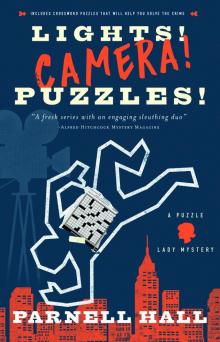 Lights! Camera! Puzzles!
Lights! Camera! Puzzles!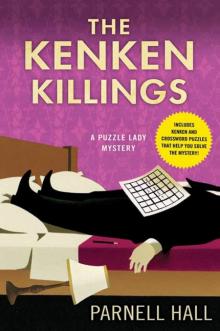 The KenKen Killings
The KenKen Killings 12-Scam
12-Scam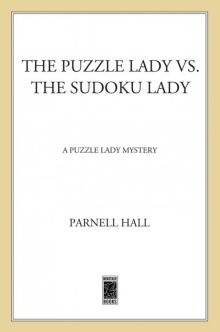 The Puzzle Lady vs. the Sudoku Lady
The Puzzle Lady vs. the Sudoku Lady 2 Murder
2 Murder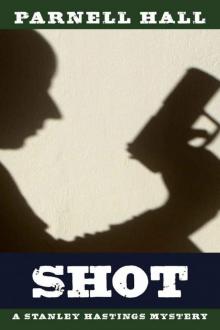 7 Shot
7 Shot You Have the Right to Remain Puzzled
You Have the Right to Remain Puzzled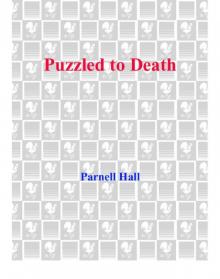 Puzzled to Death
Puzzled to Death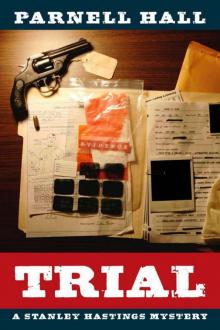 11-Trial
11-Trial The Witness Cat (Steve Winslow Mystery)
The Witness Cat (Steve Winslow Mystery) With This Puzzle, I Thee Kill
With This Puzzle, I Thee Kill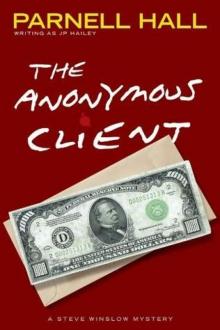 The Anonymous Client sw-2
The Anonymous Client sw-2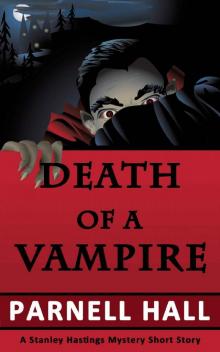 Death of a Vampire (Stanley Hastings Mystery, A Short Story)
Death of a Vampire (Stanley Hastings Mystery, A Short Story) The Wrong Gun sw-5
The Wrong Gun sw-5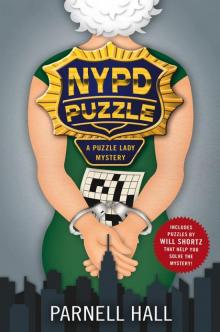 NYPD Puzzle
NYPD Puzzle 6 Juror
6 Juror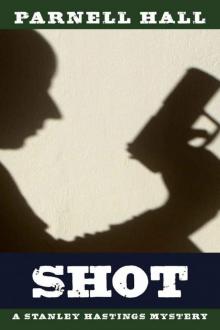 07-Shot
07-Shot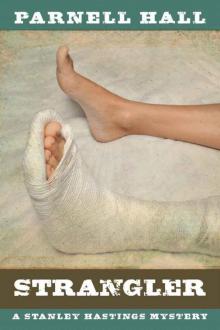 04-Strangler
04-Strangler 02-Murder
02-Murder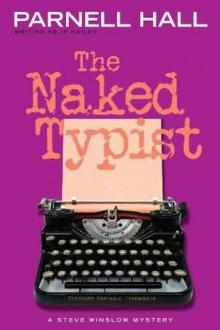 SW04 - The Naked Typist
SW04 - The Naked Typist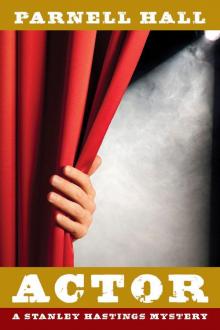 Actor
Actor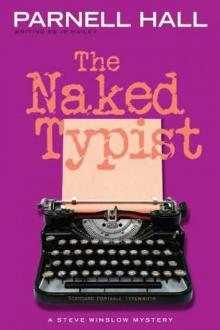 The Naked Typist sw-4
The Naked Typist sw-4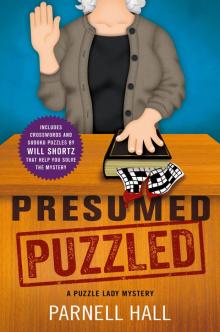 Presumed Puzzled
Presumed Puzzled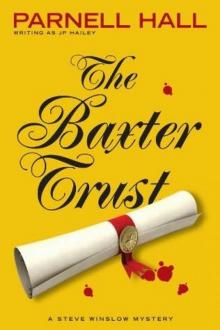 SW01 - The Baxter Trust
SW01 - The Baxter Trust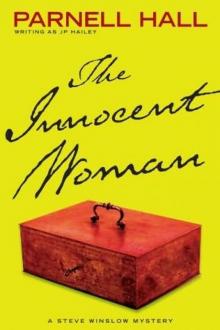 SW06 - The Innocent Woman
SW06 - The Innocent Woman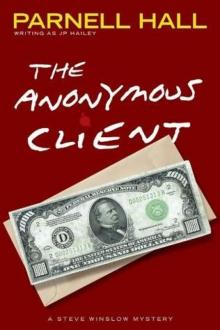 SW02 - The Anonymous Client
SW02 - The Anonymous Client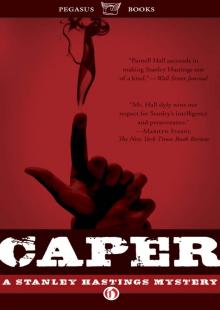 Caper
Caper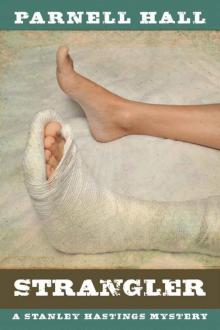 4 Strangler
4 Strangler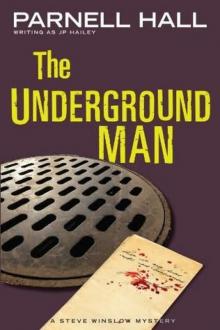 The Underground Man sw-3
The Underground Man sw-3 Manslaughter (Stanley Hastings Mystery, #15)
Manslaughter (Stanley Hastings Mystery, #15)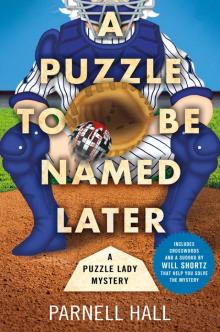 A Puzzle to Be Named Later--A Puzzle Lady Mystery
A Puzzle to Be Named Later--A Puzzle Lady Mystery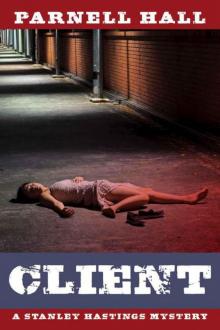 05-Client
05-Client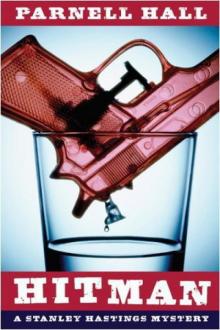 16 Hitman
16 Hitman SW05 - The Wrong Gun
SW05 - The Wrong Gun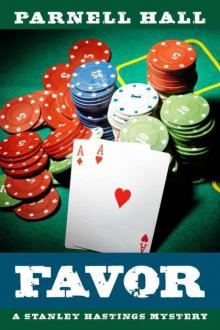 3 Favor
3 Favor Last Puzzle & Testament
Last Puzzle & Testament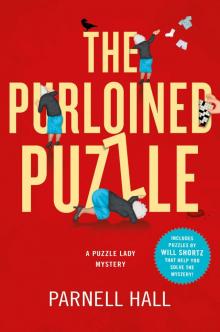 The Purloined Puzzle
The Purloined Puzzle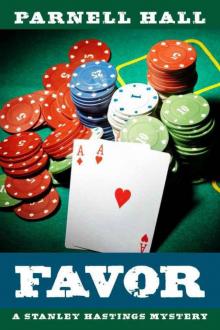 03-Favor
03-Favor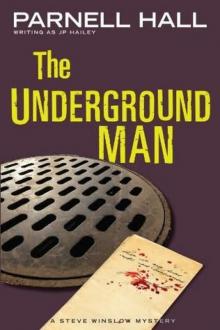 SW03 -The Underground Man
SW03 -The Underground Man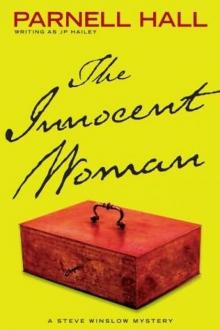 The Innocent Woman sw-6
The Innocent Woman sw-6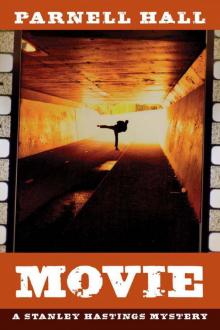 10 Movie
10 Movie 06-Juror
06-Juror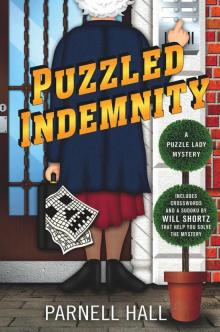 Puzzled Indemnity
Puzzled Indemnity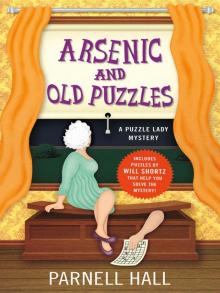 Arsenic and Old Puzzles
Arsenic and Old Puzzles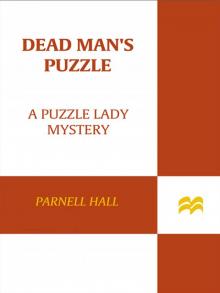 Dead Man's Puzzle
Dead Man's Puzzle Safari
Safari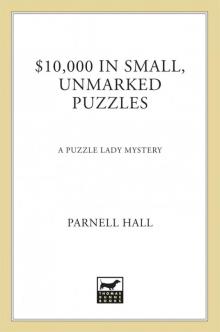 $10,000 in Small, Unmarked Puzzles
$10,000 in Small, Unmarked Puzzles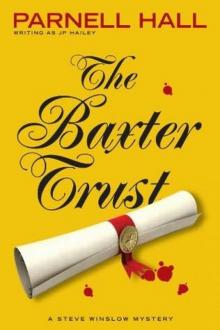 The Baxter Trust sw-1
The Baxter Trust sw-1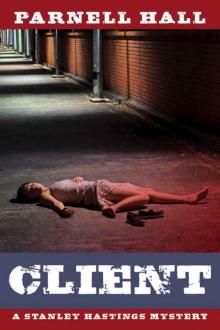 5 Client
5 Client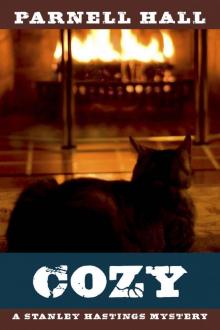 Cozy (Stanley Hastings Mystery, #14)
Cozy (Stanley Hastings Mystery, #14)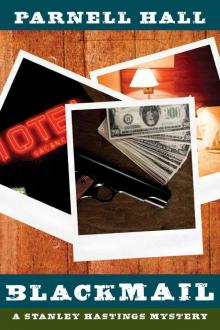 Blackmail
Blackmail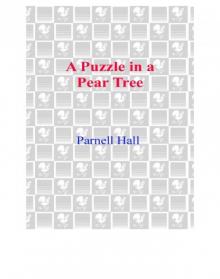 A Puzzle in a Pear Tree
A Puzzle in a Pear Tree A Clue for the Puzzle Lady
A Clue for the Puzzle Lady Clicker Training (Stanley Hastings Mystery, A Short Story)
Clicker Training (Stanley Hastings Mystery, A Short Story)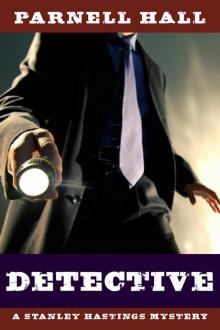 Detective (Stanley Hastings Mystery Book 1)
Detective (Stanley Hastings Mystery Book 1) 13 Suspense
13 Suspense